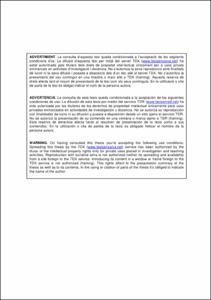Mostra el registre d'ítem simple
Resource management research in ethernet passive optical networks
| dc.contributor | Sallent Ribes, Sebastià |
| dc.contributor | Gutiérrez González, Lluís |
| dc.contributor.author | Garfias Hernández, Paola |
| dc.contributor.other | Universitat Politècnica de Catalunya. Departament d'Enginyeria Telemàtica |
| dc.date.accessioned | 2014-05-16T10:55:52Z |
| dc.date.available | 2014-05-16T10:55:52Z |
| dc.date.issued | 2013-11-25 |
| dc.identifier.citation | Garfias Hernández, P. Resource management research in ethernet passive optical networks. Tesi doctoral, UPC, Departament d'Enginyeria Telemàtica, 2013. DOI 10.5821/dissertation-2117-95224. |
| dc.identifier.uri | http://hdl.handle.net/2117/95224 |
| dc.description.abstract | The last decades, we have witnessed different phenomenology in the telecommunications sector. One of them is the widespread use of the Internet, which has brought a sharp increase in traffic, forcing suppliers to continuously expand the capacity of networks. In the near future, Internet will be composed of long-range highspeed optical networks; a number of wireless networks at the edge; and, in between, several access technologies. Today one of the main problems of the Internet is the bottleneck in the access segment. To address this issue the Passive Optical Networks (PONs) are very likely to succeed, due to their simplicity, low-cost, and increased bandwidth. A PON is made up of fiber optic cabling and passive splitters and couplers that distribute an optical signal to connectors that terminate each fiber segment. Among the different PON technologies, the Ethernet-PON (EPON) is a great alternative to satisfy operator and user needs, due to its cost, flexibility and interoperability with other technologies. One of the most interesting challenges in such technologies relates to the scheduling and allocation of resources in the upstream (shared) channel, i.e., the resource management. The aim of this thesis is to study and evaluate current contributions and propose new efficient solutions to address the resource management issues mainly in EPON. Key issues in this context are future end-user needs, quality of service (QoS) support, energy-saving and optimized service provisioning for real-time and elastic flows. This thesis also identifies research opportunities, issue recommendations and proposes novel mechanisms associated with access networks based on optical fiber technologies. |
| dc.format.extent | 133 p. |
| dc.language.iso | eng |
| dc.publisher | Universitat Politècnica de Catalunya |
| dc.rights | ADVERTIMENT. L'accés als continguts d'aquesta tesi doctoral i la seva utilització ha de respectar els drets de la persona autora. Pot ser utilitzada per a consulta o estudi personal, així com en activitats o materials d'investigació i docència en els termes establerts a l'art. 32 del Text Refós de la Llei de Propietat Intel·lectual (RDL 1/1996). Per altres utilitzacions es requereix l'autorització prèvia i expressa de la persona autora. En qualsevol cas, en la utilització dels seus continguts caldrà indicar de forma clara el nom i cognoms de la persona autora i el títol de la tesi doctoral. No s'autoritza la seva reproducció o altres formes d'explotació efectuades amb finalitats de lucre ni la seva comunicació pública des d'un lloc aliè al servei TDX. Tampoc s'autoritza la presentació del seu contingut en una finestra o marc aliè a TDX (framing). Aquesta reserva de drets afecta tant als continguts de la tesi com als seus resums i índexs. |
| dc.source | TDX (Tesis Doctorals en Xarxa) |
| dc.subject | Àrees temàtiques de la UPC::Enginyeria de la telecomunicació |
| dc.title | Resource management research in ethernet passive optical networks |
| dc.type | Doctoral thesis |
| dc.subject.lemac | Xarxes òptiques passives |
| dc.identifier.doi | 10.5821/dissertation-2117-95224 |
| dc.identifier.dl | B 13565-2014 |
| dc.rights.access | Open Access |
| dc.description.version | Postprint (published version) |
| dc.identifier.tdx | http://hdl.handle.net/10803/134603 |
Fitxers d'aquest items
Aquest ítem apareix a les col·leccions següents
-
Departament d'Enginyeria Telemàtica [114]
-
Totes les tesis [5.461]


